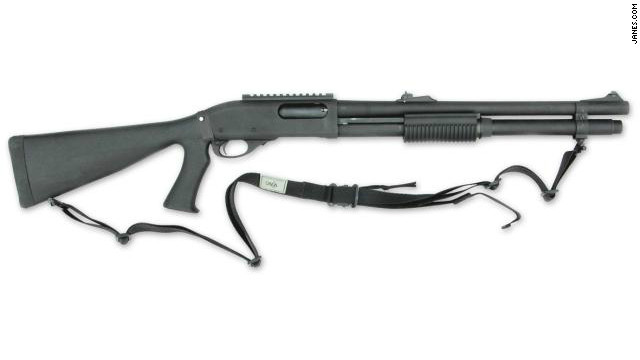When will America wake up to gun violence?
updated 4:11 PM EDT, Sat July 21, 2012
STORY HIGHLIGHTS
- A gunman went on a shooting rampage in a movie theater in Colorado
- John J. Donohue: Our gun policy is made by the NRA
- Look to Australia in formulating an effective gun control policy, he says
- Donohue: The question is, will our country ever unify against gun violence
Editor's note:
John J. Donohue is C. Wendell and Edith M. Carlsmith professor of law
at Stanford Law School and research associate at the National Bureau of
Economic Research.
(CNN) -- Last night's shooting rampage
at a movie theater in Aurora, Colorado, was a nightmare. Authorities
have already arrested a suspect. Four weapons were recovered in the
shooting scene, including a shotgun and two handguns. Twelve people have
been killed, with many more injured. According to law enforcement
officials, the weapons were purchased legally by the suspect in the last
six months.
The shooting was
senseless. And it makes us think once again about how we can address the
horrific problem of gun violence in America.
The first task is
conceptual -- can we figure out what will work? The second task is
political -- can plausible solutions be implemented legislatively?

John J. Donohue
The conceptual problem is
immensely difficult, especially in a society that is already as
gun-saturated as America is today. The political problem borders on the
impossible. Gun policy in this country is made by the National Rifle
Association, and no serious effort at gun control can currently get past
its veto.
Even when legislation
passed during the Clinton years in the form of the Brady bill, requiring
background checks at the time of gun purchases, or the assault weapons
ban, the NRA succeeded in injecting gaping loopholes into the laws.
Who needs to go through a
background check at Walmart when you can get your gun without one at
the local gun show or from some shady figure on a street corner?
The assault weapon ban
only prohibited the manufacture of new guns (it grandfathered in a huge
cache of pre-existing weapons) and gun manufacturers easily redesigned
their guns to circumvent the ban. The NRA then trumpets how "gun
control" doesn't work.
But it can.
Listen to theater shooting 911 calls
Hear events as they occur during the first 30 minutes of the shooting at the 'Dark Knight" premiere in Aurora, Colorado
Consider what happened in Australia after a crazed gunman killed 35 people in Port Arthur, Tasmania, in 1996.
The Australian federal
government persuaded all states and territories to implement tough new
gun control laws. Under the National Firearms Agreement (NFA), firearms
legislation was tightened throughout the country. National registration
of guns was imposed and it became illegal to hold certain long guns that
might be used in mass shootings.
The gun ban was backed up by a mandatory buy-back program that substantially reduced gun possession in Australia.
The effect was that both
gun suicides and homicides (as well as total suicides and homicides)
fell. Importantly, while there were 13 mass shootings in Australia
during the period of 1979--96, there have been none in the sixteen years
since.
In 1996, then-Prime
Minister John Howard stated that the "whole scheme is designed to reduce
the number of guns in the community and make Australia a safer place to
live." The Australian attorney general praised the cooperation and
responsibility of Australian firearms owners with the gun controls and
buy-back, saying, "they have been paid cash for their firearms - giving
our nation a welcome Christmas gift by removing unnecessary high-powered
firearms from the community. It offers all of us the real chance of a
safer festive season and New Year."
Of course, the
Australian gun control law in 1997 enjoyed an extremely high level of
public support and was not hampered by any domestic gun industry (since
Australia did not have any).
Such would not be the
case in the United States where pro-gun political views and NRA power
create a very different climate. In the wake of another tragic massacre
of innocent lives, we should look carefully at the Australian experience
to see if the American public will ever rise up as one against gun
violence.
Follow us on Twitter @CNNOpinion
Join us on Facebook/CNNOpinion
The opinions expressed in this commentary are solely those of John J. Donohue.
A Look at Colorado Gun Laws
Gun violence in the U.S. is simultaneously shocking and commonplace
March 10, 2012
By Jan C. Ting
Here are two typical stories from the inside pages of today's paper, documenting the daily toll of gun violence. In Jacksonville,
Florida, a Spanish teacher who had been fired that morning, returned to
the office of the head of school, pulled an AK-47 from a guitar case,
and killed the head of school and himself. In Pittsburgh,
Pennsylvania, a gunman opened fire in the lobby of a psychiatric clinic
at the University of Pittsburgh Medical Center killing one person and
wounding seven before being shot to death himself by a police officer.
We've become familiar with these kinds of stories. That's why they
appear on the inside pages now. Mentally ill person pulls a gun and
kills people. Again. Fired employee returns with a gun and kills his
boss. Again.
After the slaughter of 32 students and teachers at Virginia Tech in
2007, there was a brief period of consideration of how guns might be
kept out of the hands of the mentally ill. But that consideration ended
when no practical or even plausible answer could be found consistent
with the Second Amendment's constitutional right to own guns.
Even for those who are neither criminals nor mentally ill, people
sometimes experience extreme stress, when fired from a job, or when a
spouse walks out, or when a home is foreclosed on, or when custody over
children is lost, or in a confrontation on the highway or in a bar. If a
gun is accessible, the potential for tragedy is heightened.
In 2007
there were 12,632 gun homicides in the U.S. and 17,352 gun suicides.
Another 69,863 Americans received non-fatal gunshot wounds. So we're
pretty used to gun violence. Of the 44 U.S. presidents, four were
assassinated with guns while in office. Other victims of political gun
violence include Robert Kennedy, Martin Luther King, and most recently
Gabrielle Giffords.
Over 58,000 American military personnel were killed in the War in
Vietnam over 20 years from 1955 to 1975. But more than that number of
U.S. civilians die from gunshots now every 2 years.
America has a unique affection for guns. I can't think of any other
country that has the right to keep and bear arms stated in its
constitution. In 2008 the Supreme Court interpreted the Second
Amendment to the Constitution as securing the right of Americans as
individuals to own firearms.
So it's good that we're used to hearing about gun violence, because
there's surely going to be more in the days, months, and years ahead.

No comments:
Post a Comment